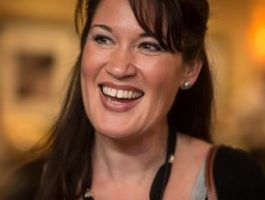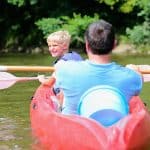
Independence
How do we help our kids through those transitional waters called adolescence? FamilyLife staff members John Majors and Michelle Hill talk about Passport2Identity™, a new resource created to answer the most pressing questions young men and women have. John and Michelle discuss a teen's longing for independence and how parents want this too, but that tensions often arise as they guide a son or daughter to successfully stand on their own.
Show Notes
About the Host
About the Guest
-
How do we help our kids through those transitional waters called adolescence? FamilyLife staff members John Majors and Michelle Hill talk about Passport2Identity™, a new resource created to answer the most pressing questions young men and women have. John and Michelle discuss a teen's longing for independence and how parents want this too, but that tensions often arise as they guide a son or daughter to successfully stand on their own.
-
Dave and Ann Wilson
Dave and Ann Wilson are hosts of FamilyLife Today®, FamilyLife’s nationally-syndicated radio program. Dave and Ann have been married for more than 38 years and have spent the last 33 teaching and mentoring couples and parents across the country. They have been featured speakers at FamilyLife’s Weekend to Remember® marriage getaway since 1993 and have also hosted their own marriage conferences across the country. Cofounders of Kensington Church—a national, multicampus church that hosts more than 14,000 visitors every weekend—the Wilsons are the creative force behind DVD teaching series Rock Your Marriage and The Survival Guide To Parenting, as well as authors of the recently released book Vertical Marriage (Zondervan, 2019). Dave is a graduate of the International School of Theology, where he received a Master of Divinity degree. A Ball State University Hall of Fame quarterback, Dave served the Detroit Lions as chaplain for 33 years. Ann attended the University of Kentucky. She has been active alongside Dave in ministry as a speaker, writer, small-group leader, and mentor to countless wives of professional athletes. The Wilsons live in the Detroit area. They have three grown sons, CJ, Austin, and Cody, three daughters-in-law, and a growing number of grandchildren.
-

John Majors
John and his wife Julie met in college while both active as students with Campus Crusade for Christ (now Cru). After graduation, they married and started serving full time in college ministry. During their time on campus, they noticed how much of what shapes a college student comes directly from their parents: the good, bad, and even the ugly. Seeing this caused their burden to serve in family ministry to grow, eventually leading to them serving with FamilyLife. It was in this season where th...more
Michelle Hill
Radio has been ingrained in Michelle for most of her life. This love for radio has taken her to various radio stations and ministries in places like Chicago, Alaska and other snow covered terrains like her hometown in north central Iowa. In 2005 she landed on staff with Cru/FamilyLife®. While at FamilyLife she has overseen the expansion of FamilyLife Today® internationally, assisted with the creation of Passport2Identity™-Womanhood and is now the host of FamilyLife This Week®...more
Michelle Hill and John Majors discuss a teen’s longing for independence and how parents want this too, but that tensions often arise as they guide a son or daughter to successfully stand on their own.
Bob: When you’re 15 years old, you’re asking yourself a lot of questions.
[Excerpt from Passport2Identity]
Girl: Alright! Instasnapface.com: “Sign up!”
“Name:” That’s easy—“Molly”
“Gender:” Female
“Age:” “15”
“Relationship:” Hmmm; well, “single”
“Religion:” Oh, wow! “Christian”?
“Occupation:” That’s a little tougher! Umm, I guess, for now, “babysitter extraordinaire” will do
“About Me:” Ugh! Now, that’s really tough! Okay, let’s see! “I’m an honor student.” Wait! Does that make me sound nerdy?
1:00
I’m not a nerd! Let’s just change “honor student” to “sophomore.” There! That’s safe. “I love going to youth group, and it doesn’t hurt that Brandon is there.” Umm, backspace—yes; “I love youth group.” We’ll just leave it at that. I don’t know! “I’m a tennis player and a piano player.” Nope, wait!—“keyboard player”—that sounds way more popstar. “Best friends with Ashley.” Ugh—about me?—about me? That’s about it!—I guess. Okay; next.
“Upload Photo:”? Oh, no! I need to Photoshop some new selfies.
[Studio]
2:00
Bob: [Laughing] And welcome to FamilyLife Today. Thanks for joining us on the Monday edition. I was just sitting listening to that and thinking, “I wonder—if you and I had been in junior high together—do you think we’d have been friends?”
Dennis: Oh, yes!
Bob: Do you think?
Dennis: Oh, yes. The teachers would have been terrified of us—[Laughter]—until the parents sent us away to some kind of—
Bob: —reform school.
Dennis: Yes; exactly!
Bob: I was kind of a goodie-goodie. You know, I was the student council type. You were a little more reckless; weren’t you, as a 15-year-old?
Dennis: I don’t like the way you’re characterizing this. [Laughter]
Bob: I know, but it’s accurate; isn’t it?
Dennis: I had a good time and pushed the boundaries. I was learning how to be independent and finding out, “Who am I?” You know?
Bob: Yes.
Dennis: “What’s life all about here?” You know, you’re terribly confused when you’re in junior high and early high school.
Bob: And I think, as parents, we’ve got to figure out how we help our kids through what can be those rough transitional waters, where you’re scratching your head, going:
3:00
“Is anyone ever going to like me?—think I’m good at anything?” “Will I be friends with anybody?” “Will I be friends with the right group?” All of those things are going on in a child’s head.
Dennis: They are. For those who are familiar with Passport2Purity®, we have what has been long-demanded, by parents across the country, who have said, “When are you going to give us something to help our kids in the early years of adolescence?” We have a new resource for the parents of young women—and the same for a young man—that we have just given birth to, here at FamilyLife. We have the authors, John Majors and Michelle Hill, joining us on FamilyLife Today. Welcome to the broadcast.
Michelle: Thank you.
John: Thanks!
Dennis: This took three long years.
Michelle: It was long.
4:00
Bob: It was three long years. That’s because we started working on this and recognized, “This needs a lot of effort, a lot of prayer, a lot of energy.” I mean, just getting into the mind of a junior high-aged student—and understanding what the issues are and then knowing how to guide them, biblically—that’s challenging!
Dennis: It is. We turned to John Majors, who’s been working, here at FamilyLife, for 15 years. John and his wife Julie speak at the Weekend to Remember® marriage getaways. We’re excited about that. Michelle Hill was the other leader, here at FamilyLife, we turned to.
Michelle: Yes!
Dennis: She’s been in a mentoring relationship with young teens for 15 years?
Michelle: Over 15 years now.
Dennis: So, even though you’re not a parent, you have been an aunt, a coach, and probably a surrogate mom to a lot of teenagers growing up. Explain what Passport2Identity is for young women.
Michelle: It is a resource—it’s a weekend resource very similar to Passport2Purity—but it’s the next step, where we’re taking the 14-16-year-old down the road of: “Who are you?” and “Who you are—that has to be rooted in Christ so that when things of the world—
5:00
—your social media account or anything else—comes at you, you’re still rooted in who you are—you know that you are in Christ.” We try to unpack that throughout the weekend for a parent and a child to go through.
Bob: John, 14-year-old boys try to act like they’ve got it all together. They try to give off this false sense of bravado: “I’m hip! I’m cool!” but they’re just as insecure as the girls are.
John: Yes, even more so. You know, they’re really trying to figure out: “What does it mean to be a man?” “What makes my life significant?” “What’s important?”
Bob: Yes.
John: We want to try to give them a biblical perspective on that—not just what the rest of the world is telling them.
Bob: Yes; because the culture—in fact, I think we say this in the resource—the culture says, for guys: “If you’re going to be a real man, that’s going to show up on the ball field, or in the bedroom,”—even for teenage boys—
John: Yes.
6:00
Bob: —“or in your bank account.” You’re really trying to call guys to say, “There’s a lot more to manhood than just that.”
Dennis: And what both John and Michelle have done in these two new Passport2Identity resources for parents is—they have given parents a way, where they can have a winning weekend experience—father and son / mother and daughter—maybe a grandfather and grandson, or an uncle and a nephew, or an aunt and a niece. But the idea is that an older person helps a young teenager know how to find purpose, know how to find their identity, know who they are so they don’t become a casualty of this culture. We want to equip you to do what you are already doing, hopefully, and help you do it even better.
Bob: All of us—if you stop and you say, “What’s your identity? Who are you?” We all default to—
Michelle: I turn to my resume.
7:00
Bob: Yes, what kind of activities are we going to be involved with?
Michelle: Yes.
Bob: Part of what we’re trying to help parents communicate with their children in this series is: “Your identity goes deeper than just the activities you’re involved with.”
Michelle: Right. In Philippians 3, Paul goes down the list of who he was—how he was circumcised on the eighth day, he was a Hebrew of Hebrews, he was a Pharisee, and he was a persecutor of the church. He goes down to the point where he kept the Law—
Bob: Right.
Michelle: —in everything; yet, he was not who he was until he was found in Christ. If we have Paul as our example—and he is saying: “It’s not the list! That’s not who you are. It’s who you are in Christ!” That’s a really hard thing to understand—is to get from that point, where we’re saying, “It’s our resume! It’s what we do!”—No, it’s not. You have to die to self. It’s your relationship in Christ. It’s what He has done for you.
8:00
Bob: You talked with somebody, John—as you were putting the guys’ session together—who I thought had a great illustration on this. Listen to the dialogue you had with—what’s his name? Byron?
John: Byron.
Bob: Yes.
[Audio Recording]
Byron: I was talking to a teen at church, just striking up conversation. I just assumed that she played softball because her sisters did. When I asked her how she liked softball, I was very surprised by how quickly she responded and said, “I’m a dancer!” Then she went on to tell me how she dances, and she’s been dancing ever since she was younger.
I was really surprised because I thought she would have said something like: “Oh, no, no, no. I don’t like softball. I like to dance.” But what really struck me was how she equated herself with being a dancer. Let’s just imagine that her ankle shatters or she breaks some bone in her leg and finds out that she’ll never dance again. Well, then, who is she? What is her identity?
9:00
It was in being a dancer; but her identity isn’t really in being a dancer—but a Christian who dances, or one who’s in Christ and dances. I think it’s all the difference.
So, when I think about identity, I think my primary concern is that their identity is, ultimately, in Jesus Christ. If you think about your identity being in something other than Jesus Christ, then you have an identity that can be taken away or that would disappear or be disappointing.
[Studio]
Bob: You know, I think that’s so critical. Dennis, you’re right. This is not something that a 14-year-old is going to grab onto quickly. But the idea that “Who you are goes deeper than just what makes you popular at school,” is critical for kids to start to wrap their heads around.
Dennis: You know, if you think about a teenager today, who are they listening to? Who are they looking to for affirmation and to help them determine who they are / what their identity is? Well, first of all—their peers.
Michelle: Yes.
10:00
Dennis: They also look to images, and music, and movies, and entertainment to find somebody to model their lives after. Here’s what I want parents to know: “You need to be the one who helps shape your child’s identity, coming from the Scripture—helping them determine, not only who they are, but also whose they are.
Michelle: Yes.
Dennis: They have been redeemed by Jesus Christ. God’s got a purpose for them!
Bob: And, at the same time that these young people are trying to figure out: “Okay; who am I? What am I good at? What’s going to make me popular?” they’re also coming to mom and dad and saying: “I’ve got this! I can handle life now. Just cut me loose and let me have all the freedom…” Their desire for independence skyrockets during these years.
John: That’s why we tried to tie this to the driver’s license because that’s when responsibility grows and freedom grows.
11:00
We use that to present the opportunity to have a conversation with your parents.
Bob: So you’re saying a parent could say to a 15-year-old, “Look, before we get you a driver’s license, we’ve got to go on the Passport2Identity weekend.”
John: Absolutely.
Bob: There’s some incentive around that; huh?
Dennis: Oh, yes! And what do they want? They want to be independent, which is not wrong; in fact, it’s healthy. As a parent, you don’t want your child being dependent—trust me!—[Laughter]—on into adulthood. You want to help them finish the process of growing up. It’s a dance of sorts. It’s not done easily, but a parent’s assignment is to meter out responsibility in a way so that the child can begin to have some successes. When they fail—not if they fail because they’re going to fail / but when they fail—you’re there to pick them up and to remind them of what they’re shooting for / what they’re going for, as a young man or as a young lady.
Bob: And some kids will assert their independence, whether mom or dad let the leash out or not; right?
12:00
Dennis: Oh, absolutely! I did that; didn’t you? [Laughter]
Bob: Well, yes. I was known to do that. And we got a true confession from your daughter in the midst of putting all of this together; right? Didn’t you talk to her?
Michelle: I did; yes. And we got a great confession about independence.
Dennis: This is our [Dennis and Barbara’s] daughter, Laura.
Michelle: It is.
Dennis: Yes; just to make sure her identity is clarified here. [Laughter] And we have her permission!
Bob: And we also have your wife Barbara sharing a little of this story. Listen—
[Excerpt from Passport2Identity]
Barbara: We prayed that God would catch them and allow them to get caught when they made mistakes. It was really amazing to see how God allowed us to catch them. As a mom, I really wanted my girls to know that God was watching and that they weren’t going to get away with it.
Laura: So I always got caught—I always got in trouble / I was always grounded. Well, not always grounded, but I felt grounded most of my sophomore year.
13:00
Barbara: It’s a healthy fear. It’s good to have a healthy fear of the Almighty and a healthy fear for your parents finding out that you might do something that you wouldn’t be really proud of.
[Studio]
Dennis: Oh, yes it is! Yes, it’s healthy fear! [Laughter] Parents need to play that card for what it’s worth! [Laughter]
Bob: Well, I’m just glad that Laura always got found out because I’m talking to my boys, now in their 20s—
Dennis: And they’re now telling you what they did that they didn’t get found out about.
Michelle: Ahhh!!
Bob: I’m learning all kinds of things and going, “I’m just glad you lived!” For whatever reason, 14-, 15-, and 16-year-old kids decide, “I’m ready for this!” and they dive in, whether mom or dad give permission or not.
John: Well, and the message we wanted to send in here is: “What we want to move towards is successful independence.” We use that phrase over and over again: “What does it look like to move toward successful independence? And then, how do you get that together?” because you’ve got to have, as Laura and Barbara just illustrated, you’ve got to have people in your life that help you move there. There’s a right way to do independence, and there’s a wrong way.
Bob: And you illustrate right and wrong in both the boys’ and the girls’ sessions.
14:00
Michelle: Right.
Bob: You say: “Look, if you do it this way, there’s a way that seems right to a teenager but the end thereof is danger. And there’s a way that seems right to God. If you follow God’s way, it can lead you to successful independence.”
In fact, there’s a great story in this first session of Passport2Identity about some young people who had kind of a crazy idea. If they’d done it on their own, it would have been really dangerous; but they got mom and dad involved, and it worked out for these kids to paddleboard across Lake Michigan.
[Excerpt from Passport2Identity]
Narrator: When you’re standing at the shore of Lake Michigan, it looks just like the ocean, stretching out as far as you can see; and the lake is dangerous like the ocean. Each year there are reports of people dying in tall waves and strong undercurrents. So when Ginny Melby and Craig Masselink threw out their big idea, they were proposing something dangerous.
Craig: Yes, it was just kind of like, “Why don’t we paddleboard across Lake Michigan?”
15:00
Narrator: No one had ever gone straight across the lake on a paddleboard before. It would be non-stop for 80 miles. They wanted to use this paddle boarding adventure to raise money and awareness for an organization helping orphans in Uganda. They called up Craig’s brother, Trent.
Trent: Craig called me up and goes: “Hey! So, Ginny and I have an idea.”
Ginny: “Hey, Trent! Do you want to paddleboard across Lake Michigan with us?”
Trent: I was like: “Yes, sure! Why not? That sounds like a fun idea!”
Ginny: Stand-up paddle boarding is like a giant surfboard—you stand on top of it. You have a long paddle with a paddle just on one end. It’s almost like a canoe, but you’re standing up.
Narrator: It wasn’t going to be easy. A storm came up. They were pelted by rain and pushed by a strong current, taking them the wrong direction.
Ginny: We had to work really, really hard to paddle towards the boat.
Narrator: And they were fighting tall waves.
Ginny: So Craig’s about 6’1.” He said, at one point, he was in a trough and couldn’t see over the top of one of the waves, just two waves on either side of him.
Craig: You couldn’t see them at night—you could only hear them. So you’d just hear the next whitecap starting to build to your right, and you knew it was about to hit you.
16:00
Ginny: That was definitely the hardest thing I’ve ever done—was trying to stay awake on the board while paddling.
Craig: I stood up, fell in, climbed back on the board, fell back in; the paddleboard flipped over. The water was cold. I remember thinking: “We should just be done. We gave it a run. We tried. It was great, but I’m ready to be done. I’m ready to throw in the towel.”
Narrator: It was at this point that community kept these young people on track.
Ginny: We knew, in order to get the person who was on the board off and give them a rest, we had to go back in the water, exhausted and sore, and keep pushing and give it all we had.
Craig: The guys on the boat—knowing I couldn’t let them down / it was knowing the kids in Uganda that we were doing it for—that we couldn’t let them down. Before I knew it, it wasn’t long until the sunrise was starting to happen; and the hope starting building in our hearts again as we saw the light.
17:00
Ginny: And we made it to shore to see about 100 of our friends and family—and even strangers who had come into town just to see us in.
Narrator: Trent, Craig, and Ginny will always remember that night, paddling against the current of the storm. They’ll remember to follow God’s plan and take bold steps in ways that will bring Him glory and, at the same time, do it with a community of people to support and encourage them along the way. All of us are going to face intimidating assignments sometimes—we’ll all go through storms. Like this paddle boarding trio, we’ll all need boldness to follow God’s plans, individually; and we all need community to help us accomplish those plans.
Craig: Community is so important. Wherever God’s working, jump in!
[Studio]
Bob: So that’s a story that is a part of the Passport2Identity experience for a parent and teen to listen to. John, what you’re hoping a 15-year-old would get, as he or she listens to that story, is that you can do big things in life if you do it right.
18:00
John: The coolest part of that story is how they didn’t make it about them, though. It wasn’t about them accomplishing something big. They made it about “How do we serve others?”—even in the midst of that—“How do we raise money for orphans across the ocean?”
Bob: Yes.
John: You know, they turned it from something which I think all of us struggle—with selfishness / being very self-centered—especially as a 14-/16-year-old, you’re really struggling with that: “Look for opportunities to serve others in that season.”
Dennis: And point your children in that direction / encourage that to occur. Many times, it is you, as a parent, who can give courage to a child with an idea that he or she may have.
Bob: Yes. The point here is that, as parents, we can’t just be all about saying, “No,” to every independent impulse our 15- or 16-year-old son or daughter has. We’ve got to go through the process, as parents, of starting to say, “Okay; I’m going to have to let go.
Dennis: Right.
19:00
Bob: “I’m going to have to let my child take some risks. I’m at a point where I know how to take those risks more wisely than the 15-year-old does. So we’ll be partners in this quest for independence that the young person is on.”
Dennis: And let’s face it—as a 14-, 15-, 16-year-old, they’re not ready to be totally on their own yet. They want that independence / they want the responsibility—well, let me rephrase that—they want the independence, but they’re not sure about the responsibility that comes with it.
John: True.
Dennis: And if a parent isn’t careful, the child / your child, as he or she is emerging into a young man or a young lady, will push you out in their efforts to establish their own identity / their own independence. If a parent isn’t careful, they’ll let the child do that too soon. It really is kind of a dance, where you’re letting the string out on the kite but not so fast that the kite soars and crashes.
20:00
A parent has to stick and stay close to a young teen as they go through these middle years of adolescence because the issues they’re facing today, in many cases, are life and death and can be with them over their entire adult lives.
Bob: And Michelle, if a mom and a daughter / or John, a dad and a son can get away for a couple of days—listen together to what you guys have put together in the Passport2Identity resource—and if the mom or the dad can say: “Look, I want you to be at a point where you can have freedom / where you can have independence. I want to help you transition from where you are today to that point where you want to go to. Let’s be partners in this endeavor rather than you just saying, ‘I’m going to do it whether you like it or not,’ and now we’re at odds with one another.”
Michelle: Well, and that calls your teen up because then, all of a sudden, your teen is like, “Oh, so you mean that maybe you’ll let me spend the weekend by myself when you guys want to get away because you trust me?”
21:00
When you show that you trust your teen, all of a sudden, your teen wants to prove that trust.
John: Luke 16:10 says, “He who is faithful in a little thing is also faithful in much.” We try to drive that home: “Show yourself faithful in a little, and we’ll give you more.”
Dennis: The big idea behind all of this is we want to help parents equip their children to grow up—to become a young man or a young lady who assumes adult responsibility/independence and take on adult commitments later on in life. These years are determinative. There are a lot of 20- and 30-somethings today who are still stuck in the 14-/16-year-old age range because they didn’t learn the lessons then; and they’re still repeating them now.
Bob: Yes. Here is what we’re hoping is going to happen this spring and this summer.
22:00
We’re hoping that a lot of moms and dads will, right now, put a couple of days on the calendar when they’re going to get away with a son or a daughter, who is 14 or 15 or 16 years old, and plan to have a Passport2Identity getaway with your teenager. Find out more about Passport2Identity for young men or young women. Go to FamilyLifeToday.com—you can order from us online. These are now available. 1-800-FL-TODAY is our toll-free number if you have any questions or want to order by phone.
After you’ve had your getaway with your teenaged son or daughter, both of you send us an email or just jot us a note and let us know how the time was. We’d love your feedback on this resource and if you felt like it was helpful in raising your son or your daughter.
Now, we want to say, “Congratulations!” to our friends, Randy and Jana Martin. They live in Lititz, Pennsylvania. Today is their 29th wedding anniversary. They listen to FamilyLife Today on WDAC in Lancaster.
23:00
We are thrilled that they are celebrating 29 years of married life together. FamilyLife is all about anniversaries. This ministry exists so that more couples will have more anniversaries throughout the years. We want to provide practical biblical help and hope for your marriage and your family. You help us do that when you partner with us, here at FamilyLife, when you make a donation to support this ministry.
We’re listener-supported. Your financial involvement is what makes all that we do possible. In fact, right now, if you can help with a donation, we’d like to send you, as a thank-you gift, Barbara Rainey’s brand-new book called Letters to My Daughters: The Art of Being a Wife. The book is our gift when you go to FamilyLifeToday.com and make a donation or when you call 1-800-FL-TODAY—make a donation over the phone and ask for Barbara’s new book. Or request the book when you make a donation and mail it to us at FamilyLife Today at PO Box 7111, Little Rock, AR; the zip code is 72223.
24:00
Now, tomorrow, we’re going to talk more about the issues teenagers are facing as they wrestle with their identity. We want to talk about understanding God’s design for you as a young man or a young woman—understanding the fact that He made you one or the other / a young man or a young woman—and “What does that have to say about who you are and your identity?” We’ll explore that tomorrow. I hope you can tune in for that.
I want to thank our engineer today, Keith Lynch, along with our entire broadcast production team. On behalf of our host, Dennis Rainey, I'm Bob Lepine. We will see you back next time for another edition of FamilyLife Today.
FamilyLife Today is a production of FamilyLife of Little Rock, Arkansas.
Help for today. Hope for tomorrow.
We are so happy to provide these transcripts to you. However, there is a cost to produce them for our website. If you’ve benefited from the broadcast transcripts, would you consider donating today to help defray the costs?
Copyright © 2016 FamilyLife. All rights reserved.
1





